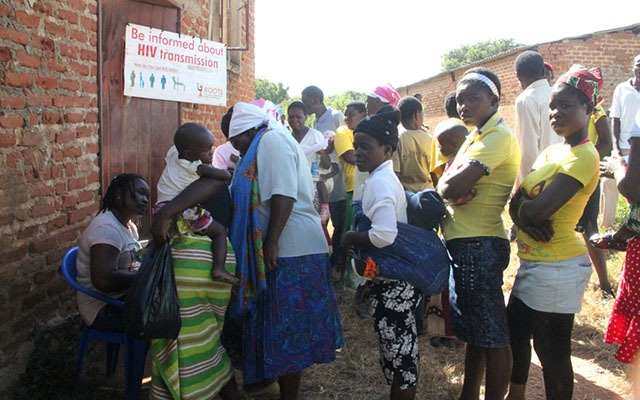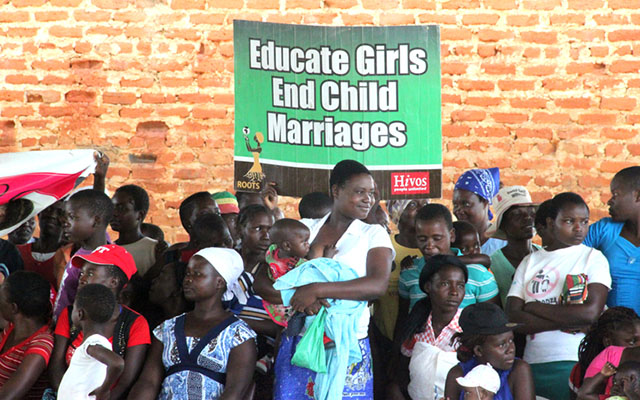Inaccesibility derails HIV testing

Sydney Kawadza Senior Features Writer
The beauty of organising events in a farming area is that the whole community gets involved, assuring organisers of genuine support from the people.
That was the case last week Saturday, when villagers, including beneficiaries of the land reform programme, converged at Woodlands Farm in Bindura, Mashonaland Central province, to discuss the scourge of childhood marriage.
The event had been organised by the Real Open Opportunities for Transformation Support, a non-profit organisation working towards the promotion of economic and social justice among young people in rural and mining communities.
Prior to the gathering, ROOTS successfully mobilised school girls and former child brides to grow a 10-heactare plot of soya beans as a way of empowering girls and young women economically.
The programme is part of the Fund-A-Farm initiative to economically empower girls and young women in the area.
Meant to celebrate the project’s success, the event drew people with different stories from child brides, traditional leaders, political leaders and ordinary villagers including parents.
After wrapping up the core business of celebrating the expected good harvest and discussing child marriage, attendees were given an opportunity to get tested for HIV free of charge.
The HIV testing offer received tremendous response as villagers jostled to know their HIV status.
The good response was not without reason.
In an interview, ROOTS programmes manager Miss Nyasha Mantosi said the HIV testing programme was popular with the villagers who did not have access to the services.
“It’s quite encouraging to see such a response from the villagers and it shows that many people are not accessing such services especially in rural areas,” she said.

Villagers who attended the campaign against child marriages at Woodlands Farm in Bindura on Saturday last week
Miss Mantosi said although Zimbabwe had recorded milestones in the fight against HIV and Aids, there was still a number of challenges affecting the battle.
She said fear, distance travelled to health centres for testing and financial resources to travel deter people who are really eager to know their status.
“The fear of getting tested is still high among Zimbabwe and there is need for information dissemination so people understand the importance of testing,” she said.
According to World Health Organisation’s Toolkit for Programme Managers on Scaling-up HIV Testing Counselling Services, increasing the demand for HIV testing and counselling services is critical for normalising HIV.
“(It is also important for) increasing the acceptance of HIV as a community issue, reducing denial, stigma and discrimination and increasing the uptake of ARV treatment and prevention.
“However, because of the stigma and discrimination associated with HIV and AIDS, many people do not wish to know their status.
“Community mobilisation for HIV testing and counselling must therefore address stigma, discrimination and fear of disclosure as well as people’s perceptions of the benefits of HIV testing and counselling.”
The organisation, however, states that in some settings, mass media and marketing approaches have proved successful in improving people’s perceptions about the benefits of knowing their status and increasing the uptake of HIV testing and counselling.
Villagers who undertook tests expressed their willingness to get tested despite the challenges faced.
“The only centre where we can get such services is in Bindura and the feeling that I should part away with my hard earned cash is a drawback on its own,” one participant said.
Another participant called on authorities to make regular visits to their villages including similar places, especially in resettlement areas.
“It’s important for everyone in Zimbabwe to know their HIV status to help authorities plan on reducing the impact of the condition.
“This should also explain the enthusiasm that has been exhibited by people who have been tested today,” he said.
It was also encouraging to note that of the 97 people tested on that particular day, only two tested positive.

A “child” mother breastfeeds her baby while members of the ROOTS-initiated Fund-A-Farm project inspect the 10-hectare soya bean field in Bindura. — (Pictures by Tariro Kamangira)
A health worker who spoke on conditions of anonymity for professional reasons, said the trend has been constant among ordinary people and expectant mothers tested for the virus.
“There has been a general decline in the new cases being detected during testing even among expecting mothers visiting various health centres across the district including Bindura urban,” he said.
Government’s Global Aids Response Progress Report for 2016 states that the HIV prevalence among adults 15 years and above was 15 percent, according to the Zimbabwe Demographic Health Survey in 2010/11.
The adult HIV prevalence has shown a declining trend and is now plateauing.
“The decline in prevalence is attributed to the impact of prevention programs aimed at behaviour change (high condom use and reduction in multiple sexual partners), prevention of Mother to Child Transmission services, and successful treatment care and support services.
“Reduction in new infections is attributed to reduction in sexual partners and increased condom use in risk sexual relationship.
“Similar behavioural change pattern has been observed through cross sectional studies among sex workers and other key populations.”
In an effort to address the key drivers of the epidemic, the country has scaled up interventions on social and behavioural change, condom promotion and distribution coupled with intensified awareness on correct and consistent use of condoms.
Other interventions include Voluntary Male Circumcision, HIV Testing Services, prevention and control of sexually transmitted diseases.
“These interventions were implemented as combination prevention services.”
HIV testing is also a crucial first step in the cascade of HIV treatment and an entry point to other prevention and care interventions including male circumcision, prevention of mother-to-child HIV transmission, and treatment of opportunistic infections.
Meanwhile, ROOTS executive director Ms Beatrice Savadye said although Zimbabwe had recorded a milestone with the Constitutional Court ruling barring child marriages more needed to be done.
This, she said, has seen her organisation implement the Fund-A-Farm initiative to economically empower girls and former child brides.
“We are continuing efforts in raising awareness against child marriages. Since the ConCourt ban, we have realised that most communities are not aware of the latest development.
“We need to make sure that people are aware of that ban and are able to utilise the pieces of legislation that are in place to end child marriages in Zimbabwe,” she said.
Ms Savadye said the Fund-A-Farm projected was initiated after they noticed that even when communities have been made aware of the scourge there was still need to empower the people.
“People are saying we are living in poverty, so some girls are being driven into child marriages because of poverty.
“So what we have done is to look for farming land where we have planted 10 hectares of soya beans for the girls,” she said.
At least 50 girls and young mothers took part in the farming project.
“They are going to benefit from the project by initiating a revolving fund where they would share the profits from the marketing of the crop among themselves,” Ms Savadye said.
“We also expect some of the girls to start paying for their own school fees.”
The project is a component of ROOTS’ livelihood and life skills for girls in the fight against child marriages.
“Such projects assist the girls to work for themselves because some of them have their own children but are already divorcees with lots of responsibilities. Imagine a 15-year-old divorcee with two children?”
In the current economic challenges, Ms Savadye said, young mothers face a number of challenges trying to take care of herself and the child or children.
“So with the livelihood skills, they are able to address their everyday needs while addressing the household poverty challenges,” she said.
After seeing the promise in the Bindura project, ROOTS has also approached local authorities for more farming land.
“We have realised that Zimbabwe has a lot of resources that the young people could utilise to make them productive.
“The piece of land we have borrowed from a local farmer to support the child brides with skills and resources have been very productive.
“We are looking for anyone or organisation in agriculture to partner us for assistance with land, farming equipment including irrigation, inputs and other provisions to come forward and join us in this noble initiative,” she said.
“This project needs a multi-sectoral approach to fight child marriages and has a potential to be spread across Zimbabwe.
The project is envisaged to target more than 100 girls in the district, resources permitting.
“We are open for partnerships so that we do not only target girls and young women in Bindura but the province or Zimbabwe at large,” Ms Savadye said.
A beneficiary of the project Elizabeth Mutsumi said she was glad that she would be able to write her Ordinary Level Examinations this year through the initiative.
“Poverty fuels child marriages especially when girls drop out of school for failing to pay the required fees and taking part in this initiative has been a relief for me and my colleagues,” she said.
Treating conversations on reproductive health as taboo has also not helped the situation.
A community health worker, Mrs Itai Chaitezvi, urged parents to take time to discuss sexual health matters with their children to fight child marriages.
“The new dispensation in the resettlement areas has seen former workers being integrated into communities dominated by former farm workers and there is a clash of cultures,” she said.
Parents, Ms Chaitezvi added, should work closely with their children to understand the challenges they may face in relation to child marriages.
According to the Zimbabwe Multiple Indicator Cluster Survey (2014), Mashonaland Central tops the list of provinces with the highest number of cases of child marriages with 50 percent of the marriages involving minors.
The province is followed by Mashonaland West with 42 percent; Masvingo 39 percent; Mashonaland East 36 percent; Midlands 31 percent; Manicaland 30 percent; Matabeleland North 27 percent; Harare 19 percent and Matabeleland South 18 percent.
Zimbabwe is among the 41 countries in the world with many cases involving minors being forced into marriages by their parents or guardians.
Issues that emerged during the discussion leading to early child marriages include abuse of orphans by their guardians, poverty, school drop-outs, abuse of technology and cultural influences.
- Feedback: [email protected]









Comments